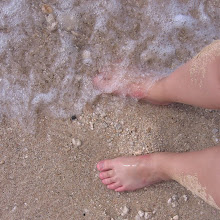The weather is changing here in my city -- I know, partly because the local news tells me so, and partly because I can feel the change in my body. I've had chronic pain since I was a teenager; one way I describe what this means for me is that I’m in a little bit of pain a lot of the time, and a lot of pain a little of the time – and cold fronts are one of the things that tip me towards more pain. So I’m thinking about pain tonight, in part because I’m more than just "thinking" it. But I'm also reflecting tonight on significant conversations I've had this week -- about institutional life, about primary relationships, about community -- and wondering whether chronic pain might serve not only as a metaphor for some of these experiences but also as a helpful navigational lens.
I should probably start by saying that my experience of chronic pain, while not "fun," is also not just a source of misery or regret. I suppose because I don't know life without it, it becomes yet another way that I make sense of my life. And I think it can be a helpful way of making sense of other experiences as well, particularly as we explore pain as more than just an experience of, well, pain.
The example of community is perhaps easiest to describe. Folks at my institution were talking this week about their memories of or desires for "community life," and were describing what they thought we have lost, what we lack, where we fail. I often interpret this sort of expression as a sort of grief, and even myself talk about the loss that always comes with change, even if good comes out of that change as well. I think grief is an important element, and not to be overlooked. However, the image of grief often evokes for me Kübler-Ross' model of grief, which suggests (among other things) that there is an end to the process (acceptance). In some ways, it offers the hope (and the challenge) that we will eventually "get over it."
Chronic pain, on the other hand, is something that one never gets over. At best, it can be managed, a contested site of struggle even in the midst of integration and acceptance. And yet even the language of "management" is somewhat problematic, at least in my experience. Something more like tenuous balance is perhaps a better image. Some of this is pretty tangible -- balancing exercise and rest, medication and meditation, hot packs and ice, effort and patience. It's also the intangibles -- for example, reminding myself that I can't just wallow in the pain even as I also can't just wish it away, and making space for sorrow and frustration along with serenity and hope. Some is a different sort of balance, such as learning when and how to be numb without being too numb, or numb too often. Some is about acceptance and communication -- not always fighting against the pain, and not trying to pretend (to yourself or to others) that the pain isn't there (okay, so I pretty much fail with this part!). And some is about cutting yourself a break when you "fail."
And so while grief may be an appropriate expression for discrete and concrete losses, it seems to me that the complexity of something like "community life" might instead be productively explored as a chronic condition. It is not -- and, I would venture, ought not be -- something that we ever solve, "get over," or find a place of pure acceptance, contentment, and rest. Instead, it too needs a sort of balance, of striving and resting, of critiquing and creating, of grieving and rejoicing, and of being attentive to limits -- not to mention thoroughly enjoying a trivia night while simultaneously attending to who is and isn't in the room, or listening careful as students express their sadness about a curricular change even without letting go of the vision and hope that this change will be "good." Chronic pain also carries a genuine sense of responsiveness and authentic responsibility -- I know that I can make my pain worse and can make it better, even as I also know that some of it is beyond my control. The desire for community is also like this -- it cannot simply be something we "grieve," because it is also something for which we are responsible, even as we simultaneously recognize that some of this is, and always will be, beyond our control.
I think this can be a helpful lens, for sense-making and for concrete action, as we consider institutions and relationships and other places of complexity and challenge. But it, too, is also not without risk, and even loss; at the very least, I think it leaves us quite a bit more to unpack. Yet the idea of "balance" also reminds me of time and patience, and so I think I'll say that this is enough for now (even though it is also not at all enough!). But that's what I'm thinking about tonight; I'll look forward to your thoughts as well.

